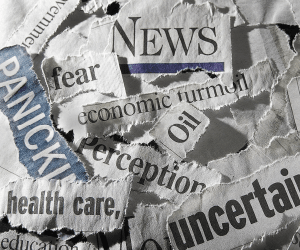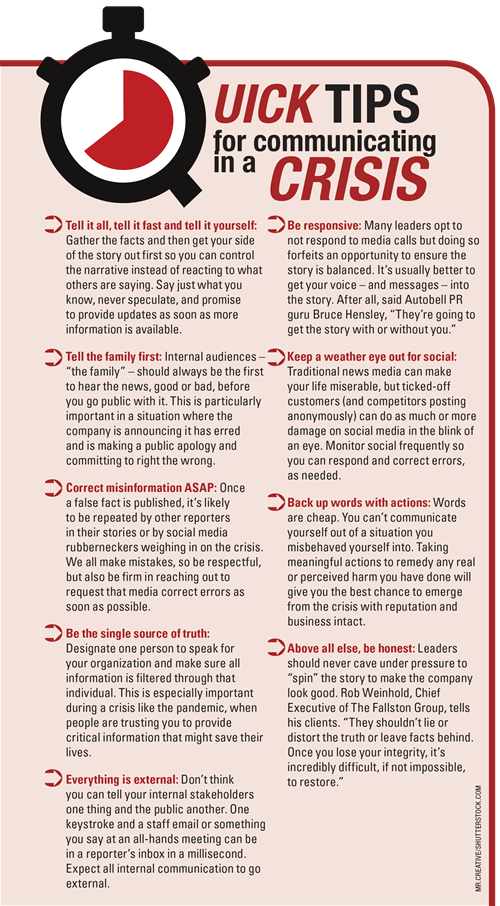
When Bad News Comes Calling
March 24, 2022
11 minute ReadBY DAVID COBURN
Soon after Splash Car Wash announced the reopening of its Benton, Ark., car wash following a January ice storm that froze water supply pipes, Justin Young realized he had a public relations crisis on his hands. The company didn’t realize some parts of the city were still without water, and the social media backlash was swift and severe.
“OMG! WTF! That is soooo wrong,” posted one of many angry customers. “Never going there again!”
“It got sideways pretty quick,” said Young, Director of Marketing for the North Little Rock-based operator. But Splash defused the situation quickly with a textbook crisis response: apologizing for its mistake, taking corrective action, and even offering free washes to utility workers.
Splash’s experience shows just how fast a company’s carefully cultivated image can be sullied and gives new relevance to the cautionary words of America’s most famous billionaire investor:
“It takes 20 years to build a reputation and five minutes to ruin it,” Warren Buffett said. “If you think about that, you’ll do things differently.”
In an era when social media and the 24-hour news cycle have turned those five minutes into five seconds, car wash operators might be well-advised to take a hard look at just how prepared they are for the moment when bad news comes calling.
 NOT A MATTER OF ‘IF’ BUT ‘WHEN’
NOT A MATTER OF ‘IF’ BUT ‘WHEN’
As crisis communications experts like to tell their clients, it’s not a matter of if, but when.
Look no further than your daily news feed and you’ll see the crises business owners wake up to every day: workplace fatalities or violence, management misdeeds and natural disasters among them. For car wash operators, it could be an angry customer with a damage claim and a hungry lawyer.
One Denver-based wash earlier this year found itself in a nasty and very public spat with a customer claiming she was rear-ended in the tunnel. Local TV jumped on the story, and the company was still dealing with the fallout – and the unflattering publicity – months later.
Even baseless rumors can spark a PR crisis. The quote, “A lie can travel halfway around the world while the truth is putting on its shoes,” was attributed to Mark Twain over a century ago, and social media has exponentially accelerated the speed at which untruths can be broadcast to a huge audience.
Not knowing when the moment might arrive for your business might be the best reason to start preparing for the inevitable today. It could happen tomorrow.
PUTTING A PROCESS IN PLACE
Most large, well-run organizations have comprehensive crisis management plans that include guidelines for handling internal as well as external communications before, during and after a crisis. But your operation doesn’t have to be large to benefit from having some basic policies and procedures in place. Large or small, you want to have some guidelines in place before the stuff hits the fan.
Breeze Thru Car Wash, a car wash company with 11 stores throughout northern Colorado and southern Wyoming, has a well-defined crisis communication plan in place, with specific policies regarding who serves as the spokesperson for the company. This plan came in handy last year, when a customer at one of its locations suffered a heart attack in the parking lot and was resuscitated by a Breeze Thru employee. The media picked up the emergency call on the police scanner and descended on the scene immediately.
With the CEO and president in an all-day meeting, next in line to respond was part-owner and Brand Manager Wade Keith, who took charge of the situation on site, calming employees and customers and managing the media. Breeze Thru Car Wash also relies on public relations support from an agency partner, Old Town Media based out of Fort Collins, Colo.
“Our main goal is to get our client through the crisis with as minimal damage as possible to their business, reputation and revenue,” said Jana Beasley, Public Relations Specialist at Old Town Media, who works closely with Keith on the company’s public relations efforts. “With Breeze Thru, it’s extremely important to respond to situations quickly and appropriately because they are so well known in (the region). If something happens, everybody knows about it, and they have such a large presence on social media that things could really snowball if you don’t have a process to get ahead of it.”
DOING THINGS DIFFERENTLY
Buffett’s sage advice about doing things differently resonates with PR pros like Beasley and crisis management expert Rob Weinhold, Chief Executive of The Fallston Group in Bel Air, Md. One of the keys to managing reputational risk is thinking ahead and anticipating potential landmines so the company can take steps to avoid them before they explode.
“You must be predictive. Burn the calories and understand your industry trends and the various points of exposure your industry, generally, faces and your business, specifically, must be prepared to manage,” said Weinhold, a Baltimore beat cop-turned-police spokesperson in his first career. “There are so many issues of sensitivity, adversity and crisis that may come down the tracks. Be ready to meet the leadership moment.”
—Rob Weinhold, The Fallston Group”
Breeze Thru Car Wash’s Keith values its partnership with Old Town Media, and its team’s ability to see things coming before they become a problem. He recalls when Beasley brought to his attention that the company’s website might run afoul of the Americans with Disabilities Act because Breeze Thru Car Wash’s primary brand colors were difficult for individuals with color-blindness to see. The company completed a thorough review to ensure the site was ADA-compliant, not only to avoid lawsuits but to provide a better experience to its customers regardless of their abilities.
“I thought that was cool because it meant we were being proactive instead of reactive toward something that could be an issue down the line,” Keith said.
CONTROLLING THE NARRATIVE
Effective crisis communications starts with gathering as much information about what happened as possible before anyone starts talking. It’s critical to make sure the information you’re putting out is accurate and consistent, and that’s one reason it’s a best practice for organizations to designate one individual to be the single source of truth on the issue at hand. The pandemic underscored just how crucial this is when new information and changes in business closures, mask mandates and other policies were coming out on a daily basis.
But time is not on your side in a crisis. One of the cardinal rules of crisis communications: “Tell it all, tell it fast, and tell it yourself.”
Getting out in front of the story to control the narrative is all-important, said Weinhold, whose crisis consulting group dubs itself “The Reputation Agency.”
“There’s a mantra in our business,” Weinhold said. “If you don’t tell your story, someone else will. And when someone else tells your story, it certainly won’t be the story you want told.”
You’ll never know all of the facts at the onset of a crisis. What’s important, according to PR pros like Weinhold, is to say what you know as soon as you know it or risk chasing the story and trying to recapture the offensive. Arm your designated spokesperson with a few key messages that summarize what is happening and what you are doing about it. Say only what you know to be true, don’t speculate on unknowns, and speak only to questions that are within your company’s area of knowledge and expertise.
In a crisis where law enforcement agencies are involved, for example, defer questions about the status of an investigation to the agencies themselves. If the crisis response will be ongoing over a period of days and impacts a large segment of the community, it’s important to provide regular updates and let the media know when the next update will be provided.
BUILDING RELATIONSHIPS THAT PAY OFF LATER
Taking a proactive approach is important not only in averting potential crises but also in building relationships with media outlets that are important to your business, according to Bruce Hensley, who has served as PR adviser to Charlotte-based Autobell for the past 22 years. Getting to know reporters and editors and making your company available for comment on stories they’re working on – in addition to making them aware of the positive things your company is doing in the community – can go a long way toward ensuring you get a fair shake when the news isn’t so great.
Go beyond the feel-good stories that many car wash operators rely on. The “grip-and-grin” photos of check presentations to local charity partners are great for social media and may help build goodwill in the community but may not get the media’s attention. Look at the kinds of stories the media is covering and figure out how you can insert your business into the flow of news.
In the midst of a dry spell? Invite a reporter out to do a story about the great water-reclamation system you’re using to conserve water. For Earth Day, ask a reporter to tag along with your volunteers on a river cleanup that shows your company’s commitment to sustainability. Even if they don’t take you up on the offer, reporters will appreciate that you’re thinking about their needs and they’ll be more likely to reach out the next time.
“Help the media do their job,” said Hensley, whose firm has media-trained hundreds of Autobell employees from store managers to C-suite executives. The training not only prepares company spokespersons for the tough questions they might face in a crisis but also helps store managers shine when reporters need help on softer news stories.
“It puts Autobell in a position where we can say yes when a TV station needs some filler,” Hensley said. “And they know they’re going to get great stuff.”
“Having a good relationship with the media is about proactive and reactive storytelling, and the more accommodating you can be while understanding the various needs of journalists, the larger your dividends will be over time,” Weinhold said. “It’s not about gaining an unfair advantage, but simply balance. That’s the goal – balance when the story is told.”
Proactive relationship-building takes time but will pay off once a crisis hits.
“Dig a well before you’re thirsty,” Weinhold said.
 ADMITTING MISTAKES — AND FIXING THEM
ADMITTING MISTAKES — AND FIXING THEM
One of the key tenets of dealing with an angry public is to admit mistakes and make a commitment to correct them. Threats of legal action can complicate matters but winning in court may be a hollow victory if you lose in the court of public opinion – and lose customers and business along the way.
The PR crisis arising out of the January ice storm showed Splash Car Wash just how important a sincere apology – coupled with doing the right thing – could be in turning a negative situation around.
After gathering the facts and realizing its error, the company shut the Benton location down again, then put out a statement apologizing for the oversight, emphasizing its commitment to the community and promising to remain closed until the rest of the city had water restored.
For Splash’s leadership team, it was an easy decision.
“It was the right thing to do,” Young said. “We didn’t do it because of the public backlash. We did it because we realized we made a mistake and we needed to ‘own’ that mistake in a transparent and genuine way.”
Young also commented retroactively on individual posts, again apologizing for the mistake and providing a link to the company’s statement. Splash went the extra step of offering free washes for Benton utility workers who had worked overtime to get the water back on.
“It got so many shares and so much engagement that it way outweighed the lost revenue from not being open, just in terms of long-term loyalty,” Young said.
“Thank you for your concern for our community,” one fan posted on Facebook. “I know this impacts your business. When it is safe for you to open again you will have my business.”
“This just makes me love Splash even more than I already did,” another customer wrote.
“I think there’s something powerful when someone just says, ‘We made a mistake,’” Young said. “Nobody does that anymore. I think people resonate with being human, to some degree.”
LEADING WITH EMPATHY
Many organizations facing criticism get wrapped around the axle with following company policy, proving the facts are on their side and being “right.” But PR pros know emotion trumps reason seven days a week, and in a battle of heads versus hearts, it’s often no contest.
That’s why it’s so important to show compassion and empathy in the heat of crisis.
Even if you’re technically justified in declining a vehicle damage claim, Beasley said, working with the customer to resolve the issue may be far less damaging to your reputation and checking account than getting into a public dustup that winds up on TV and in court.
“You have to have a lot of empathy when it comes to crisis PR, and you have to know that fine balance between being the authority in the industry and understanding where your consumers are coming from,” Beasley said. “If you treat one customer bad, the rest of them are going to believe you will treat them that way as well.”
“We always take an approach that we’re going to err on the side of excessive empathy, even if it isn’t necessarily the best thing for our business,” said Splash’s Young. “We try to send our communications in ways that connect with peoples’ hearts.”
TAKING THE LONG VIEW
Experts say, it’s not about the crisis, it’s about how you respond to the crisis. The annals of business history are chock-full of case studies of companies that emerged stronger from a situation that posed an existential threat to their business.
Tylenol remains the gold standard of crisis communications best practices, nearly 40 years after it responded to the 1982 product-tampering incident that resulted in seven deaths. Tylenol made the decision early on that it would be honest, transparent and cooperate fully with the media. The company spent millions on a product recall and helped develop product protection methods that became the standard for its industry.
even if it isn’t necessarily the best thing for our business.
—Justin Young, Splash Car Wash”
Contrast that with BP’s handling of the 2010 Deepwater Horizon oil rig explosion, which killed 11 workers. The company’s response was marred by insincerity, refusal to take responsibility and efforts to downplay the scale of the disaster. Communications reflected a failure of leadership at the very top of the company – capped by CEO Tony Hayward’s “I want my life back” comment.
“There’s a misnomer in the marketplace that crisis communications is how to effectively spin a story,” The Fallston Group’s Weinhold said. “I believe you don’t spin your way through crisis, you lead your way through crisis.”
Communicating through a crisis is the greatest challenge many organizations will ever face. The key to success is taking the long view – drawing up your communications playbook well in advance, preparing your leaders to respond effectively, building those media relationships, and understanding how you respond today will affect your business next month or next year.








